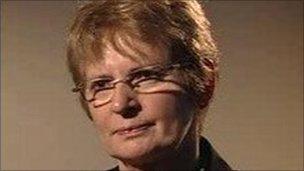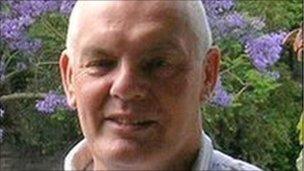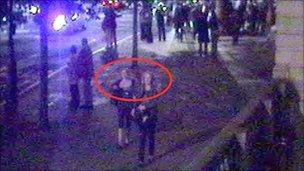London attack 'shows homosexuals face huge prejudice'
- Published

Jenny Baynham heard about the fatal attack from her mother
It was in an early morning phone call that Jenny Baynham learned about a brutal attack on her brother.
Clearly distraught, her elderly mother said: "Oh Jen, I have got some terrible news."
Ms Baynham had spoken to her older brother Ian, 62, the night before he went out to celebrate his new job.
She too had secured a new job and the siblings had spoken about how their first week had gone.
Her new post had brought her back to London after 10 years in Australia, closer to her mother and two brothers.
But on the morning of 25 September, 2009, her world fell apart when her mother relayed the news of the Trafalgar Square attack.
Homophobic taunts
Ms Baynham said: "I was absolutely shattered. I couldn't imagine my mother would ever tell me anything like that. She was desperately upset... At that point I didn't know it was a homophobic attack."
During the trial the court heard Mr Baynham was subjected to homophobic taunts before being punched to the ground.
Joel Alexander, 19, landed the blow before Rachel Burke and Ruby Thomas, both 18, kicked him as he lay unconscious.

Ian Baynham died 18 days after the attack
Thomas and Alexander were found guilty of manslaughter. Burke was convicted of affray.
Mr Baynham died 18 days after the attack, which was fuelled by "drunkenness and loutish behaviour", Brian Altman QC, prosecuting, told the jury.
Mr Baynham's friend of 10 years, George Richardson, said: "I heard about the attack about 15 minutes after it happened.
"Philip [Brown], who was with him on the night, rang me from Trafalgar Square.
"Philip had told me on the phone how it started so I knew it [was a homophobic attack] straight away."
He then told Mr Baynham's sister about the nature of the attack.
'Real concern'
She said she felt "bewildered" at learning the reason and sitting through the trial had been a "shocking" ordeal.
"I don't think anything has really changed and I think there's still a huge prejudice.
"I think as individuals everybody has feelings about different sections of society but it is tolerance that is so important.

The two attackers were captured on CCTV in the area where the fatal assault happened
"I don't feel angry but I feel a sense that something positive has to come out of it."
A spokesman for gay rights group Stonewall said although reporting of homophobic crime had increased it remained a "real concern" and the "tragic death" of Mr Baynham was just one example.
He said: "Lesbian and gay people in London are over one-and-a-half times more likely to alter their behaviour to avoid homophobic hate crime than gay people in the South West and Wales."
A YouGov study for Stonewall showed that one in five homosexuals had experienced a hate crime or incident in the past three years.
He added: "People don't develop homophobic attitudes overnight and suddenly start attacking gay people.
"Stonewall's research has shown that homophobic bullying and violence is endemic in Britain's schools.
"Nine in 10 secondary school teachers and more than two in five primary school teachers say that children - regardless of their sexual orientation - currently experience anti-gay bullying in their schools."
Identifying hotspots
Figures from the Metropolitan Police show that between April 2009 and March 2010 homophobic crime rose by 22.2% from the previous 12 months - from 1,093 to 1,336 incidents.
The highest number of incidents were reported in the City of Westminster - up from 86 to 124 - where Ian Baynham was beaten to death.
Up to March 2010, Camden saw 100 (up from 70), Lambeth 98 (67), Southwark - 83 (58), Islington 75 (down from 86) and Bromley recorded 74 incidents (48).
In 2006-07 1,147 crimes were reported, in 2007-08 there were 961 crimes reported and this rose to 1,093 in 2008-09.
A Met spokesman said hate crime was still under reported but there had been a growing willingness of victims to report.
He said: "We recognise that the under-reporting of hate crime represents missed opportunities - to keep victims safe or otherwise support them, to identify and tackle repeat perpetrators and to identify and police hate crime hotspots, and thus we are always seeking ways to increase reporting."
Dean Ingledew, operational director for community safety in Westminster, said: "We are incredibly proud of Soho's vibrant gay community.
"We take this type of crime extremely seriously.
"We are working with the gay community to encourage the reporting of such attacks and we are closely monitoring the crime stats so any emerging issues can be quickly tackled.
"But when you take into account the 200 million annual visitors to the West End the chances of becoming a victim of any kind of crime in Westminster is thankfully extremely remote."
- Published23 November 2010